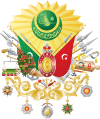Nükhetsezâ Hanım
| Nükhetsezâ Hanım | |||||
|---|---|---|---|---|---|
| Born | Hatice Hanim Hatug 2 January 1827 Abkhazia | ||||
| Died | 15 May 1850 (aged 23) Constantinople, Ottoman Empire (present day Istanbul, Turkey) | ||||
| Burial | Imperial ladies Mausoleum, New Mosque, Istanbul | ||||
| Spouse | |||||
| Issue | Şehzade Ahmed Efendi Aliye Sultan Nazime Sultan Şehzade Mehmed Burhaneddin | ||||
| |||||
| House | Ottoman (by marriage) | ||||
| Father | Baras Hatuğ Bey | ||||
| Mother | Ferhunde Hanim | ||||
| Religion | Sunni Islam | ||||
Hatice Nükhetseza Hanım (Ottoman Turkish: نکت سزا خانم; "rich parfume"; 2 January 1827 – 15 May 1850) was a consort of Sultan Abdulmejid I of the Ottoman Empire.
Life
Nükhetsezâ Hanım was born on 2 January 1827. She was the daughter of the Abkhazian nobleman Baras Hatuğ Bey and his wife, the Georgian Ferhune Hanim, and her real name was Hatice. She grew up at court under the tutelage of Bezmiâlem Sultan, mother of Abdülmecid I, where she take the name of Nükhetseza.[1] She was an excellent singer and a good painter and player of piano. She married Abdulmejid on 21 October 1841, that he had fallen in love with her after hearing her sing, and was given the title of "Second Ikbal". In 1842 she give birth her first child, a daughter, Aliye Sultan, who died in the same year. In 1845, was given the title of "BaşIkbal" (First Ikbal).[2] A year after the marriage, on 5 June 1846, she gave birth to her second child, a son, Şehzade Ahmed, in the Old Çırağan Palace. The prince died the next day on 6 June 1846.[2] In June 1846, the French Ambassador, François-Adolphe de Bourqueney, noted that, Abdulmejid, who had been away on his trip to Rumelia was interrupted suddenly, and had to return urgently to console his favorite who just had an "unhappy childbirth".[3]
A year later, on 27 November 1847, she gave birth to her third child, a daughter, Fatma Nazime Sultan in the Old Beylerbeyi Palace.[4] The princess died five days later on 1 December 1847.[5] A year later, on 23 May 1849, she gave birth to her fourth and last child, a son, Şehzade Mehmed Burhaneddin in the Old Beylerbeyi Palace. Burhaneddin was her only child to survive.[6]
Death
Nükhetsezâ died on 15 May 1850 of tuberculosis, and was buried in the mausoleum of the imperial ladies at the Yeni Mosque, Istanbul. After her death, her son Mehmed was adopted by Neverser Hanim, another consort of Abdülmejid who had no children.[6][7]
Issue
| Name | Birth | Death | Notes |
|---|---|---|---|
| Aliye Sultan | 1842[8][9] | 1842[8][9] | born in Çırağan Palace;[8] buried in New Mosque[8] |
| Şehzade Ahmed | 5 June 1846[8][9] | 6 June 1846[8][9] | born in Çırağan Palace;[8] buried in New Mosque[8] |
| Fatma Nazime Sultan | 26 November 1847[5][10] | 1 December 1847[5][10] | born in Beylerbeyi Palace;[5] buried in New Mosque[5] |
| Şehzaden Mehmed Burhaneddin | 23 May 1849[6][10][11] | 4 November 1876[11] | After his mother's death he was adopted by Neverser Hanim. He married thrice and had a son and a daughter[12][13] |
In literature
- Nükhetsezâ is a character in Hıfzı Topuz's historical novel Abdülmecit: İmparatorluk Çökerken Sarayda 22 Yıl: Roman (2009).[14]
See also
References
- ^ Sakaoğlu 2008, p. 600.
- ^ a b Uluçay 2011, p. 216.
- ^ Eldem, Edhem (2018). The harem seen by Prince Salahaddin Efendi (1861-1915). Searching for women in male-authored documentation. p. 27.
- ^ Adra, Jamil (2005). Genealogy of the Imperial Ottoman Family 2005. p. 13.
- ^ a b c d e Uluçay 2011, p. 226.
- ^ a b c Uluçay 2011, p. 217.
- ^ Sakaoğlu 2008, p. 601.
- ^ a b c d e f g h Uluçay 2011, p. 216-17.
- ^ a b c d Paşa 1960, p. 144.
- ^ a b c Paşa 1960, p. 145.
- ^ a b Brookes 2010, p. 279.
- ^ Bey, M.S. (1969). Osmanlı devletinde kim kimdi. Küğ yayını. Küğ Yayını. p. 220.
- ^ Turkey. Meclis-i Mebusan (1982). Meclisi Mebusan zabıt ceridesi. TBMM Basımevi. p. 4.
- ^ Hıfzı Topuz (2009). Abdülmecit: İmparatorluk Çökerken Sarayda 22 Yıl: Roman. Remzi Kitabevi. p. 196. ISBN 978-975-14-1357-4.
Sources
- Uluçay, M. Çağatay (2011). Padişahların kadınları ve kızları. Ötüken. ISBN 978-9-754-37840-5.
- Sakaoğlu, Necdet (2008). Bu Mülkün Kadın Sultanları: Vâlide Sultanlar, Hâtunlar, Hasekiler, Kadınefendiler, Sultanefendiler. Oğlak Yayıncılık. ISBN 978-6-051-71079-2.
- Paşa, Ahmed Cevdet (1960). Tezâkir. [2]. 13 - 20, Volume 2. Türk Tarih Kurumu Basımevi.
- Brookes, Douglas Scott (2010). The Concubine, the Princess, and the Teacher: Voices from the Ottoman Harem. University of Texas Press. ISBN 978-0-292-78335-5.

